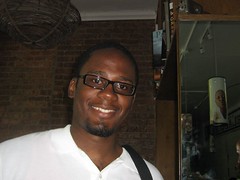
I have been slow to write about the world cup because I didn’t really know where to jump in. I had an idea for a piece about how Michael Jordan might’ve become the greatest soccer goalie of all-time if he ever took up the sport, this piece was inspired by watching footage of
I’ve also been on the move too much to really sit down and flesh out that idea or anything really substantial about the world cup, not to mention some event just create their own narratives and they don’t need writing hacks like me to intervene.
All of this seemed to change however this week when I got caught up in what can only be described as Ghana-mania during my stay out here in 
It was hilarious watching the Ghanaians in attendance calling all the Afro-American players “traitors” for playing against their homeland, then two seconds later conceding that the Americans could have them because they weren’t that good anyway. Since it’d been years since I last played the beautiful game, I forgot exactly how much trash-talking goes on both on and off the pitch. Yankee and Red Sox fans have nothing on soccer fans when it comes to cutting down their adversaries. Fortunately, as a Haitian, I was playing the role of
Ghana-mania was ratcheted up a notch when my friend and her dad turned their attention my beloved
Being the gracious host that I am I bit my tongue, and did not say anything, deciding instead to wait calmly until Ghana played Brazil in their next match—then we’d see who’s confused.
Unfortunately, I had forgotten exactly when that match was so when I got this email appeal from a friend this morning, I was, for a lack of a better word, “CONFUSED:”
"Les gaulois nos ancetres", vous connaissez bien cette expression que les francais ont utilise pour laver les cerveaux des noirs sous l'esclavage et la colonisation. Les haitiens, qui ont ete les premiers a rompre le fardeau oppresif de l'esclavage--ont toujours compris que nos vrais ancetres sont des Africains de Dahomey (aujourd'hui le
["Les gaulois nos ancetres" this all too familiar expression was used by the French to brainwash Black minds during slavery/colonization. Haiti, as the first country to break free from France's colonial yoke, never trusted this lie--Haitians always know that our real ancestors are Africans from Dahomey (present day Benin)...of course, because this was before West Africa was divided into countries, it is possible that we do have ancestors from the region known as The Gold Coast--present day Ghana. It is in this spirit of pride in our African roots that I encourage all family members to root for
It wasn’t the fact that I had to read French first thing in the morning that confused me, but I couldn’t really figure out what prompted my friend to send this appeal. Sure I knew she had a Ghanaian husband, so that must’ve changed her allegiances, from Ghana to Brazil, but her email had thrown a huge wrench in the post-colonial soccer matrix. Like most post-colonialists I eagerly look forward to any matches that pit the former colonizers against the former colonized (e.g. Trinidad vs.
However, never did I think of these matches in a post-slavery context. It was easy to laugh at my Ghanaian friend and her dad taunting the African-American players, but it wasn’t until I received my other friend’s email this morning that I realized that there really was something in those taunts, there were some traitors on the pitch, but, I wouldn’t be so quick to label the African-American players as traitors (which of course they are not). If we are talking about traitors and the legacy of slavery—and reading soccer through a post-slavery then on what side exactly should members of the African Diaspora cast their allegiances in matches where an Africanist nation like Brazil plays a African nation like Ghana?
Let me put this another way, should black folks in the Americas root for
Before I could answer this question for myself, I got a SMS message from my Ghanaian friend informing me that things were looking bleak for

The match ended, and like most Haitians I know I am happy that
Those who saw the match saw Ronaldo score his 15th goal in world cup play to become the tournaments all-time leading scorer. This historical moment meant a lot to soccer fans who saw one of the best players from the last decade do what he does best, score, but was clearly another heartbreaking blow to Ghanaians whose team was defeated 3 – nil.
Ronaldo’s goal five minutes into match may have decided the outcome, but it does little for answering the question posed earlier, on whose side are the children of the African-Diaspora to hitch their wagons when their diaspora-cousins battle those long lost family members from the motherland?
Two interesting articles on Joe Gaetjens, the Haitian born member of the 1950
http://en.wikipedia.org/wiki/England_v_United_States_(1950)
http://www.webster.edu/~corbetre/haiti/misctopic/sports/gaetjens.htm








